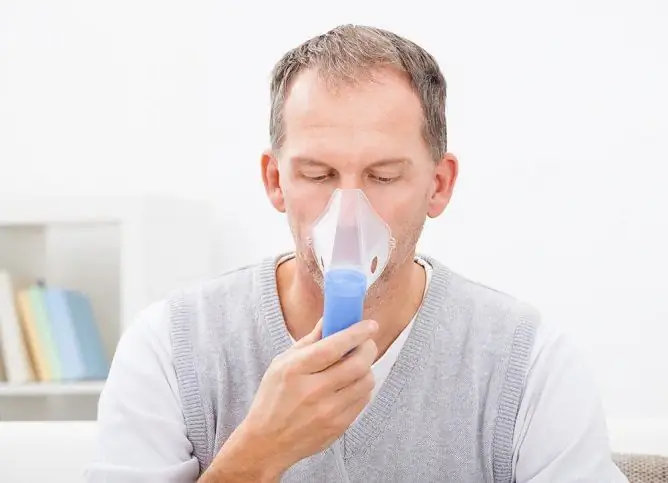- Author Rachel Wainwright wainwright@abchealthonline.com.
- Public 2023-12-15 07:39.
- Last modified 2025-11-02 20:14.
Urinary incontinence in men

Urinary incontinence in men is a condition in which involuntary urination (incontinence) occurs periodically.
The likelihood of this disease increases with age, but there is no direct relationship. Urinary incontinence in men, as a rule, is not a separate disease, but a consequence of various pathological processes. Practically without affecting physical well-being, this disease significantly reduces the quality of life, complicates everyday, family, professional and social adaptation, inducing a number of psychological problems.
The main types of urinary incontinence in men are:
- Stressful. Excretion of urine can provoke physical activity, coughing, laughter. The excreted amount of urine is usually insignificant;
- Urgent (imperative). Excretion of urine occurs due to an intolerable urge to urinate. A large amount of urine is usually passed.
Urinary incontinence in men: causes
The main causes of urinary incontinence in men are:
- Age-related changes in the tissues of the prostate gland, pelvic muscles, organs of the genitourinary system;
- Cancer or adenoma (benign hyperplasia) of the prostate;
- Side effects of prostate surgery;
- Injury to the brain or spinal cord, as a result of which control over the work of the bladder is lost;
- Infectious diseases in the lower urinary tract and bladder;
- Deposition of stones in the bladder, in the kidneys;
- Neurological diseases such as stroke, Parkinson's disease, multiple sclerosis;
- Taking certain medications, such as antihistamines and decongestants
- Stress, mental illness.
Male urinary incontinence: treatment
Treatment of urinary incontinence in men is prescribed depending on the type of disease.
It is recommended to treat stress-type incontinence conservatively, using the following measures in combination:
- Special exercises to strengthen the pelvic muscles;
- Special exercises to strengthen the muscles of the perineum and the sphincter apparatus - Kegel complex;
- Certain medications.
Treatment of urinary incontinence in men with an urgent type of disease is prescribed after determining the causes of it. Effective therapy for prostate adenoma or prostatitis, in case of their disease, can be a solution to the problem of urgent incontinence.
In diseases of a neurogenic or unknown nature of urinary incontinence in men, treatment is reduced to drug relaxation of the bladder muscle, removal of its involuntary contractions and an increase in the functional capacity of the bladder.
You should not treat urinary incontinence in men with alternative methods and means, since this can only aggravate the course of the disease.
To prevent incontinence, you should limit the use of alcohol, coffee, quit smoking and stop taking medications with diuretic properties. It is necessary to control your weight, because extra pounds can put additional stress on the bladder and provoke urinary incontinence in men.
Nocturnal urinary incontinence in men
Nocturnal urinary incontinence in men is enuresis, a fairly common occurrence, especially in the age group over 45. More than half of all manifestations of enuresis in adult men are the result of untreated childhood diseases. In other cases, doctors state acquired or, so-called, secondary bedwetting in men.
Specialists qualify the following types of enuresis in men:
- Constant;
- Relapsing;
- Acquired.
At the first manifestations of bedwetting, a man should immediately go to a doctor to get qualified medical care. Enuresis is not only a psychological problem, it can cause various diseases of the genitourinary system, such as inflammation of the bladder (cystitis).
Male urinary incontinence: medications

When conservative therapy does not lead to a decrease in the incidence of urinary incontinence in men, drugs can only be prescribed by the attending physician.
In modern medicine, there are the following types of drugs for urinary incontinence in men:
- Alpha blockers (drugs based on terazosin, doxazosin, tamsulosin, alfuzosin). They stimulate relaxation of the smooth muscles of the bladder neck and prostate gland, normalize urine flow and prevent disruption of bladder contractions leading to urgent incontinence. In general, alpha blockers are used if urinary incontinence in men is due to benign prostatic hyperplasia;
- 5-alpha reductase blockers (drugs based on finasteride, dutasteride). Drugs for inhibiting the production of dihydrotestosterone, which is the cause of benign prostatic hyperplasia. Are taken to reduce the frequency of urinary incontinence or urinary retention by reducing the size of the prostate gland;
- Tricyclic antidepressants (drugs based on imipramine). The drugs relax the muscles and block the nerve impulses that cause bladder spasms;
- Antispasmodics (drugs based on active ingredients: propantheline, tolterodine, oxybutynin, darifenacin, trospium chloride, solifenacin succinate). A class of drugs that relax muscles and reduce bladder cramps.
For simple urination disorders, the doctor may recommend treatment with homeopathic and phytotherapeutic drugs Urilan, Enuran, etc. To treat age incontinence, homeopathic injections for men Super Optimal are practiced.
All drugs are prescribed by the attending physician after a comprehensive examination and an accurate diagnosis.
YouTube video related to the article:
The information is generalized and provided for informational purposes only. At the first sign of illness, see your doctor. Self-medication is hazardous to health!






